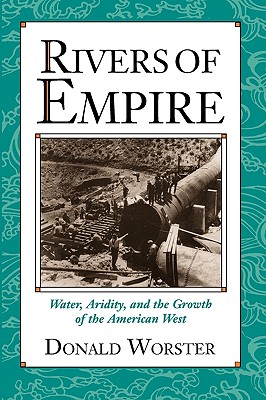

 Oxford University Press, USA
Oxford University Press, USA
Rivers of Empire: Water, Aridity, and the Growth of the American West


Key Metrics
- Donald Worster
- Oxford University Press, USA
- Paperback
- 9780195078060
- 9.2 X 6.14 X 1.13 inches
- 1.29 pounds
- Business & Economics > Real Estate - General
- English
 Secure Transaction
Secure TransactionBook Description
The American West, blessed with an abundance of earth and sky but cursed with a scarcity of life's most fundamental need, has long dreamed of harnessing all its rivers to produce unlimited wealth and power. In Rivers of Empire, award-winning historian Donald Worster tells the story of this dream and its outcome. He shows how, beginning in the mid-nineteenth century, Mormons were the first attempting to make that dream a reality, damming and diverting rivers to irrigate their land. He follows this intriguing history through the 1930s, when the federal government built hundreds of dams on every major western river, thereby laying the foundation for the cities and farms, money and power of today's West. Yet while these cities have become paradigms of modern American urban centers, and the farms successful high-tech enterprises, Worster reminds us that the costs have been extremely high. Along with the wealth has come massive ecological damage, a redistribution of power to bureaucratic and economic elites, and a class conflict still on the upswing. As a result, the future of this hydraulic West is increasingly uncertain, as water continues to be a scarce resource, inadequate to the demand, and declining in quality.
Rivers of Empire represents a radically new vision of the American West and its historical significance. Showing how ecological change is inextricably intertwined with social evolution, and reevaluating the old mythic and celebratory approach to the development of the West, Worster offers the most probing, critical analysis of the region to date. He shows how the vast region encompassing our western states, while founded essentially as colonies, have since become the true seat of the American Empire. How this imperial West rose out of desert, how it altered the course of nature there, and what it has meant for Thoreau's (and our own) mythic search for freedom and the American Dream, are the central themes of this eloquent and thought-provoking story--a story that begins and ends with water.
Author Bio
Donald Worster is one of the founders of, and leading figures in, the field of environmental history. He is currently Distinguished Foreign Expert and senior professor in the School of History of Renmin University of China.
Before coming to Beijing, Worster held the position of Hall Distinguished Professor of American History at the University of Kansas from 1989 until his retirement.Worster has been active in environmental history since the early 1970s, in the United States and other parts of the world. In 1971, he completed his Ph.D. at Yale University, where he studied the history of ecology, environmental literature, intellectual history, and the history of the American West. Formerly the president of the American Society for Environmental History, Worster has served on a number of editorial boards, and, for more than two decades, has been founding editor for the Environment and History book series published by Cambridge University Press.
He is an elected member of the Society of American Historians and the American Academy of Arts and Sciences. In 2011 and 2013 he was a Fellow at the Rachel Carson Center for Environment and Society at LMU Munich.Worster’s books include Nature’s Economy: A History of Ecological Ideas; Dust Bowl: The Southern Plains in the 1930s; Rivers of Empire: Water, Aridity, and the Growth of the American West; A River Running West: The Life of John Wesley Powell; and A Passion for Nature: The Life of John Muir; along with several books of collected essays including The Wealth of Nature: Environmental History and the Ecological Imagination.
His current research focuses on two projects: Darwinian and post-Darwinian science and the concept of adaptation as theoretical bases for environmental history, and the twin, competing themes of natural abundance and scarcity in American and modern world history.
Source: The Ohio State University
Videos






Community reviews
Write a ReviewNo Community reviews